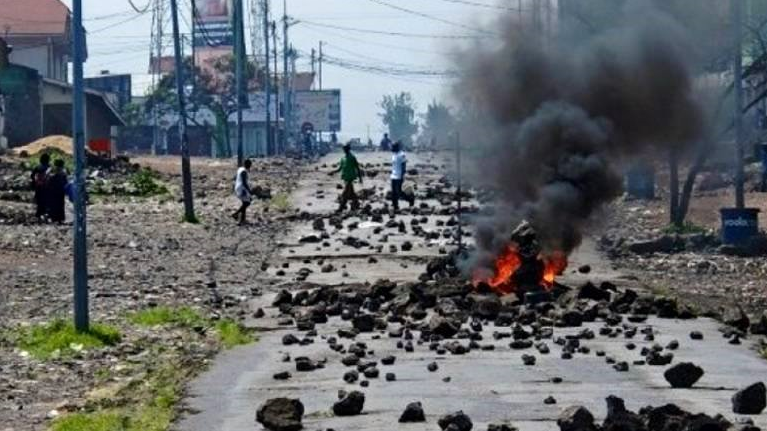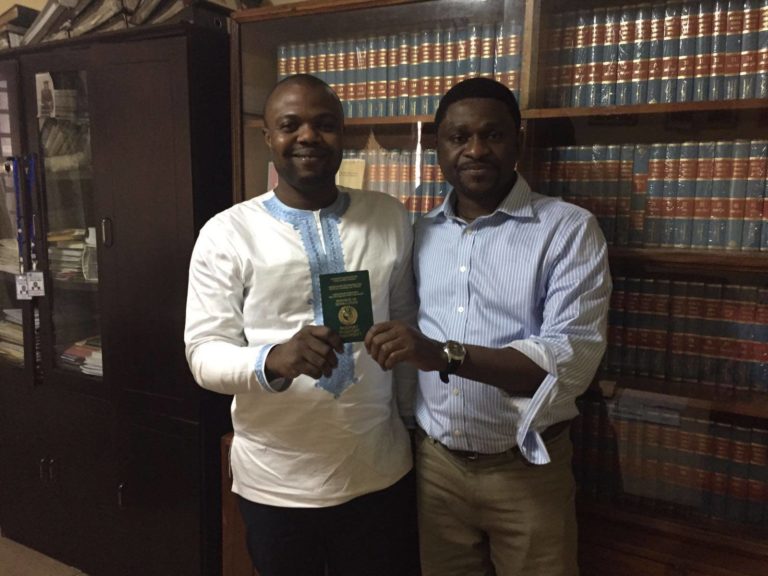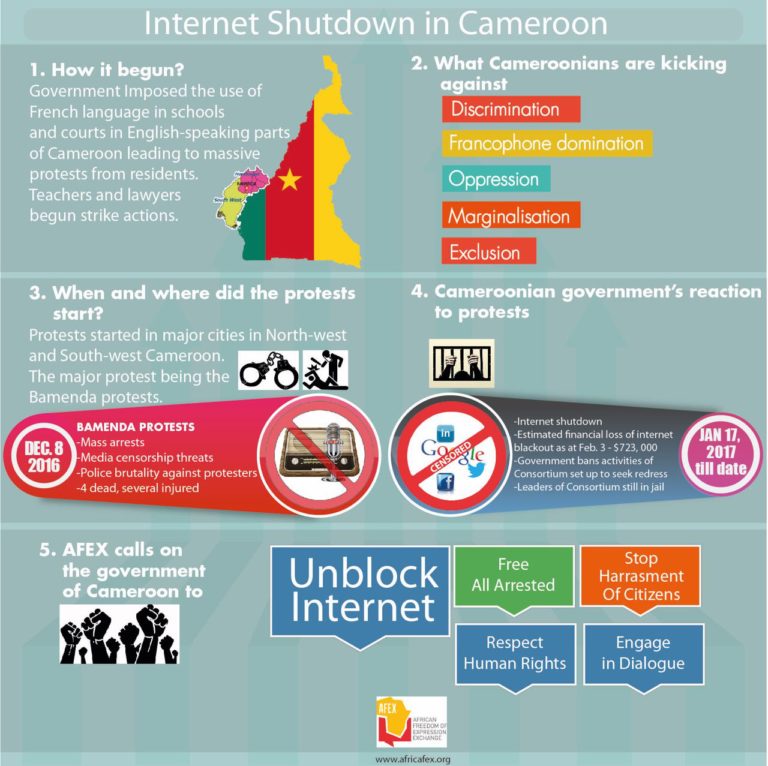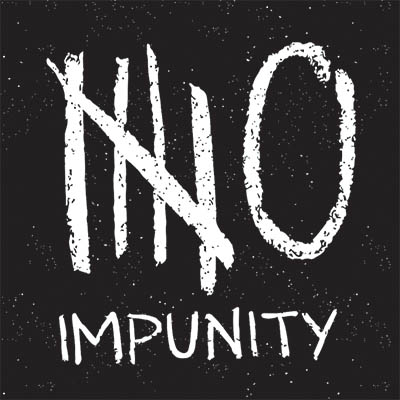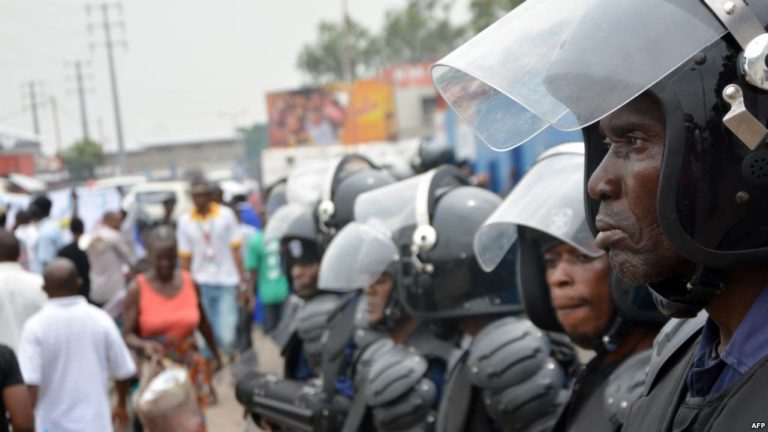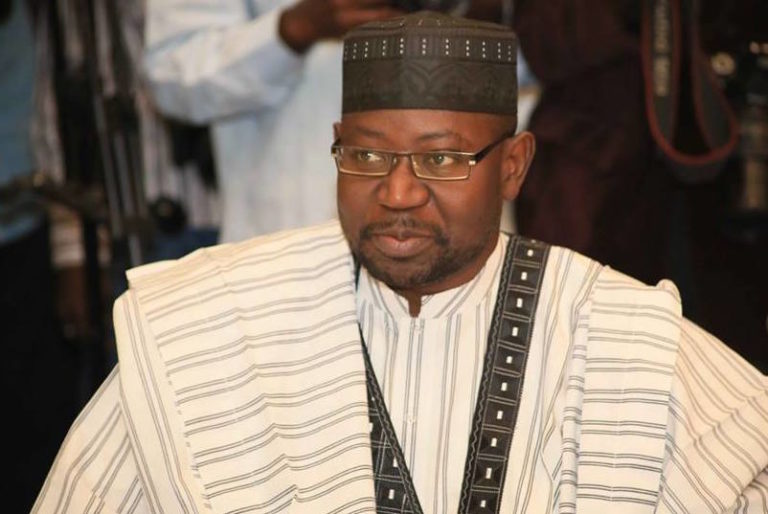Exactly sixty days ago, today (March 17, 2017), the government of Cameroon shut down the internet and banned the activities of the Cameroon Anglophone Civil Society Consortium (CACSC), a group of eminent citizens from the Anglophone regions set up to dialogue with the government on the ongoing protests in the country.
Since November 2016, there have been protests in Cameroon’s two Anglophone regions stemming from the decision of the government to impose French language in schools and courts of the predominantly Anglophone regions. This move has been described by leaders and people of the two regions as evidence of the Cameroonian government’s policy to “marginalise the English-speaking minority.”
On January 17, 2017, the national telecommunication and internet service provider, CAMTEL, shut down internet services in the North-west and South-west regions of Cameroon. On the same day, the government banned activities of the CACSC. The police arrested two leaders of the CACSC, Dr. Nkongho Felix Agbor-Balla and Dr. Fontem A. Neba.
From January 17 – March 17, 2017, several influential local and international human rights organisations, networks, agencies, and millions of individuals have condemned the internet shutdown and the arbitrary arrests of Dr. Agbor-Balla and Dr. Neba as a flagrant abuse of the fundamental rights of the people of the affected regions. Several appeals by the international community urging the President of Cameroon, Paul Biya to restore the Internet and resort to dialogue in order to resolve the situation and bring calm to Southern Cameroon remain futile.
On January 17, 2017, the Association for Progressive Communication (APC), an international network of about 50 members from 35 countries denounced the shutdown and called on the government of Cameroon to order the immediate reinstatement of internet connectivity for all citizens and residents of Cameroon as well as take urgent measures to align Cameroon’s policy, statutory and regulatory instruments with international law.
Furthermore, on January 20, 2017, Amnesty International also called on the Cameroonian government to unconditionally release Dr. Agbor-Balla and Dr. Neba and as well as lift the ban imposed on the activities of the Consortium.
On January 22, over 20 Civil Society Organisations (CSOs) from around the world jointly petitioned the Cameroonian government to restore Internet connectivity in the two Anglophone regions as well as demonstrate its commitment to protect human rights online. Again on February 17, 2017, the CSOs presented another letter to the telecommunications companies in the country urging them to unblock the Internet.
Similarly, the African Freedom of Expression Exchange (AFEX), a network of freedom of expression and media rights organisations in Africa, on January 24 urged the Paul Biya government to protect freedom of expression rights. The AFEX network again called on the government on February 24, 2017 to unblock the internet and release the leaders of the Consortium.
In addition, Professor Sean O’Brien, Head of International Human Rights Law at Notre Dame University in the US, on January 31, filed a petition for urgent action with the Special Procedures of the United Nations Human Rights Council after Dr. Nkongho was charged with treason, terrorism, and other capital offenses by a military court in Cameroon.
The UN Special Rapporteur on freedom of expression, David Kaye, on February 10, called on the government of Cameroon to restore internet services to the two affected regions. He expressed concern at the tightening of the noose on freedom of expression at a time where its promotion and protection should be of the utmost importance. Kaye further indicated that “a network shutdown of this scale violates international law – it not only suppresses public debate, but also deprives Cameroonians of access to essential services and basic resources.”
On February 13, 2017, the Law Society of Upper Canada, a network of over 50,000 lawyers and some 8,000 paralegals petitioned President Paul Biya to free Barrister Nkongho Felix Agbor Balla. The letter also called on President Paul Biya to comply with Cameroon’s obligations under international human rights laws, including the United Nations’ Basic Principles on the Role of Lawyers.
On February 16, 2017, some 10 members of Parliament and Senators of the ruling Cameroon’s People’s Democratic Movement (CPDM) in North-west region also joined the international community to demand the release of the leaders of the CACSC.
On March 8, 2017, the Mo Ibrahim Foundation joined the International community to appeal to the Cameroonian government to facilitate efforts to restore the internet and mobile services.
Despite these and other calls made by other human rights groups, the government of Cameroon is yet to respond as the Internet connection remains blocked. Dr. Agbor-Balla and Dr. Neba have also been charged by the Yaoundé military court for alleged acts of terrorism, inciting civil war, inciting secession, and spreading false information. The two who could face the death penalty if found guilty under Cameroon’s Anti-Terrorism law, have pleaded not guilty to the charges.
Millions of individuals across the globe have condemned the Internet blockage in Anglophone Cameroon and the arrest of leaders of the Consortium on social media with hashtag #BringBackOurInternet.
In 2015, experts from the United Nations (UN) Organisation for Security and Co-operation in Europe (OSCE), Organisation of American States (OAS), and the African Commission on Human and Peoples’ Rights (ACHPR), issued a historic statement declaring that internet “kill switches” can never be justified under international human rights law, even in times of conflict.
Similarly, in July 2016, the United Nations Human Rights Council passed a landmark resolution that condemned Internet shutdowns or disruptions during important national events such as elections, protests or terror attacks.
Internet shutdowns deny citizen access to critical information. Aside this, it has a weighing effect on the economy. As at February 20, 2017, four weeks after the shutdown was imposed in Cameroon, Access Now, an international non-profit organisation estimated financial loss from the shutdown at $1.39 million.
The African Freedom of Expression Exchange (AFEX) again appeals to President Paul Biya to respond to the calls of the international community by:
- Unconditionally restoring Internet access in the North-west and South-west regions.
- Releasing those arrested and resorting to dialogue in resolving the crisis.
- Demonstrating commitment to uphold and defend human rights as enshrined in the Constitution of Cameroon as well as regional and international frameworks to which Cameroon is signatory.




